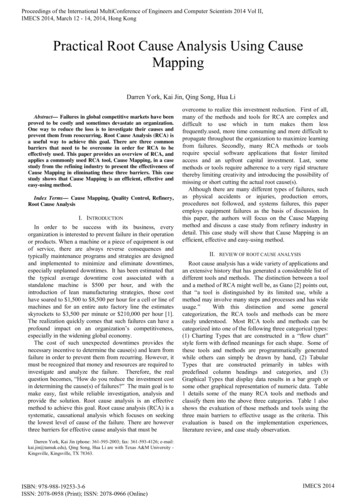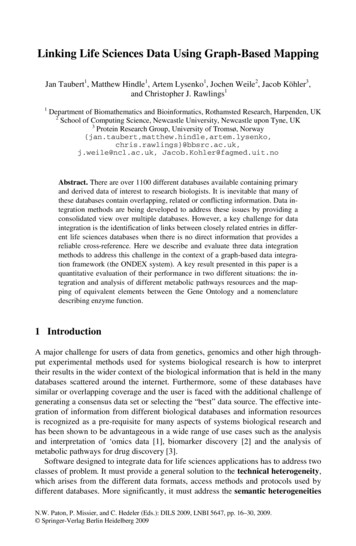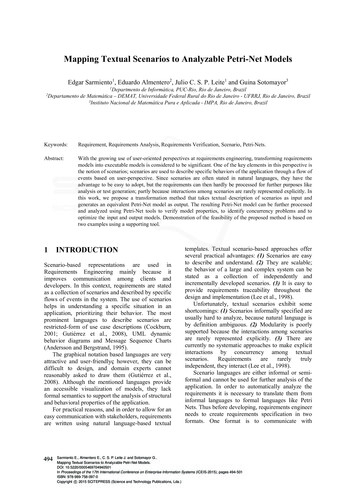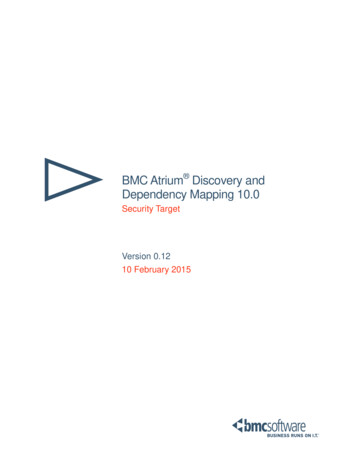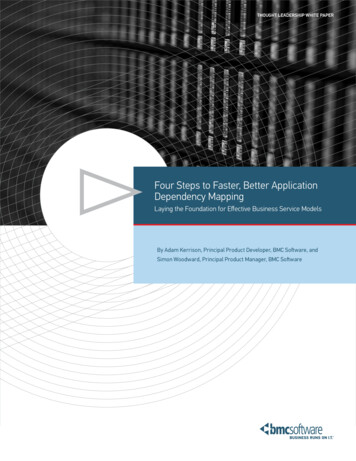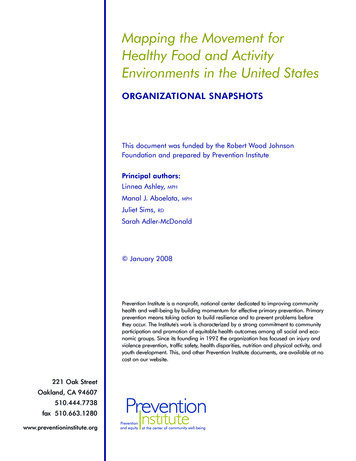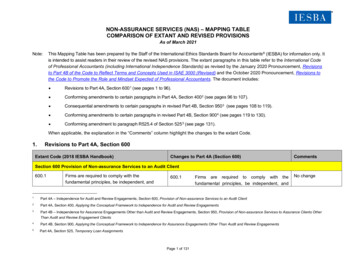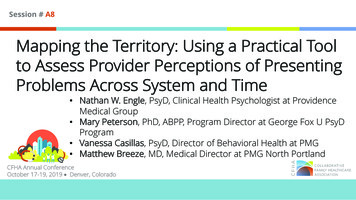
Transcription
Session # A8Mapping the Territory: Using a Practical Toolto Assess Provider Perceptions of PresentingProblems Across System and Time Nathan W. Engle, PsyD, Clinical Health Psychologist at ProvidenceMedical Group Mary Peterson, PhD, ABPP, Program Director at George Fox U PsyDProgram Vanessa Casillas, PsyD, Director of Behavioral Health at PMG Matthew Breeze, MD, Medical Director at PMG North PortlandCFHA Annual ConferenceOctober 17-19, 2019 Denver, Colorado
Faculty DisclosureThe presenters of this session have NOT had any relevantfinancial relationships during the past 12 months.
Conference ResourcesSlides and handouts shared by our conferencepresenters are available on the CFHA websiteat https://www.cfha.net/page/Resources 2019and on the conference mobile app.
Learning Assessment A learning assessment is required for CE credit. A question and answer period will be conducted atthe end of this presentation.
Bibliography / Reference1. Fisher, L., Dickinson, W., & Anderson, Norman B. (2014). Psychology and Primary Care. AmericanPsychologist, 69(4), 355-363.2. Miller, B., Brown Levey, S., Payne-Murphy, J., & Kwan, B. (2014). Outlining the scope of behavioral health practice inintegrated primary care: Dispelling the myth of the one-trick mental health pony. Families, Systems & Health : The Journalof Collaborative Family Healthcare, 32(3), 338-43.3. Hunter, C.L., Dobmeyer A.C., Reiter (2018) Integrating Behavioral Health Services into Primary Care: Spotlight on thePrimary Care Behavioral Health (PCBH) Model of Service Delivery. Journal of Clinical Psychology in Medical Settings 25,105–108.4. Sandoval, B. E., Bell, J., Khatri, P., & Robinson, P. J. (2017). Toward a unified approach: Uniting diverse primary carestrategies under the primary care behavioral health (PCBH) model. Journal of Clinical Psychology in Medical Settings.5. Hunter, C. L., Funderburk, J. S., Polaha, J., Bauman, D., Goodie, J. L., & Hunter, C. M. (2017). Primary care behavioralhealth (PCBH) model research: Current state of the science and a call to action. Journal of Clinical Psychology in MedicalSettings. https://doi. org/10.1007/s10880-017-9512-0.
Learning ObjectivesAt the conclusion of this session, the participant will be able to: Attain a consultative tool that can be used to enhance anyBehaviorally Integrative setting Identify areas of program development or trainingopportunities in one’s own practice Practice interprofessional consultation skills
Primary Care Landscape Primary care settings are ever-growing Interdisciplinary teams needed to treat patients Limited resources and endless list of expectations Efficient workflows and patient care strategies require coordinationof these limited resources
Biggest Questions How can Behavioral Health Providers Care for patients where and when they need it the most Collaborate with PCPs and APCs to support their work with patients Offer interprofessional education within the everchanging healthcarelandscape Be their own program development advocates Optimize limited resources for sustainability and effectiveness Sound familiar!?
Providence Medical Group Oregon and SW Washington 58 Family Medicine, Internal Medicine, and MedicalSpecialty Clinics with at least one embedded BHP Usually a Licensed Psychologist North Portland clinic is one of the first clinics to have aBH Integration program full time. Around 10,000 registered patients currently Currently 1 FTE Licensed Psychologist and .4 Psychologistgraduate students in-training
Quality Improvement Survey Quantify the frequency and type of issues seen by medicalproviders Patient issues relevant to BHPs Educate APCs/PCPs about: Role of BHPs within the PMG system What interventions or functions look like How to access BHPs
Quality Improvement Survey To inform Behavioral Health Providers (BHP) of medicalproviders’ impressions of the most frequently seenbehavioral health related concerns To increase provider awareness of the services offered byBHPs system wide Consisted of the 36 most prevalent health concerns withbehavioral health interventions 5-point likert scale survey Completed by 78 APCs & PCPs across 12 PMG clinics Completed biannually by the North Portland Clinic, 6 iterations
Screening Tool
Screening Tool
Survey ResultsBattle GroundEsther Short11344Mill PlainVancouver11344North nnyside123413333Happy Valley4Mercantile12244Behavioral Heath ConcernsSherwoodAnxietyCardioDepressionDiabetes
Survey Results, e.g.
Survey Results, e.g.
Survey Results, e.g.
Survey Results, e.g.
Survey Results Most prevalent concerns ofeach APC & PCP: AnxietyDepressionObesityCardiovascular issuesDiabetes Top quartile across clinics: AnxietyDepressionCardiovascular issuesDiabetes
Presenting Problems Overall “The Big ety21%
Total Percent of VariancePresenting ProblemsOther44%Big Four56%
Clinic Specific DifferencesNorth Portland AnxietyDepressionSubstance useChronic medicalconditions
Clinic Specific DifferencesSherwood Anxiety ADHD Depression
Clinic Specific DifferencesSunnyside Depression Anxiety Obesity
North Portland Longitudinal Results
Deeper dive!Seasonal Variation4.03.53.02.52.01.51.00.50.0Anxiety, panic, socialissuesDepression, isolation, Cardiovascular disease, Insomnia, restlessness,anhedoniahypertensionprescription sleepmedicationQ1 17Q3 17Q1 18Q3 18Q1 19Q3 19
QI ProjectsProvidence Medical Group Pain Education ClassNorth Portland Family Medicine Clinic BH Specific Stages of Change training Interprofessional CollaborationSurvey Evaluation Challenging Patient Situations trainings Trauma Informed Care trainings Community referral workflow updates Optimizing Psychiatry Consultation ADHD Evaluation Protocol Suboxone Prescription Credentialing Suicide Risk Assessment and SafetyPlanning School/Community Partnerships Seasonal Affective Disorder workflow changes Quarterly “BH Updates” with research andworkflow updates Tobacco Cessation trainings Topical CE trainings Clinic Wide Diabetes Educator and groups Patient intake changes Upcoming: Memory screening training for PCPs/APCs
Utilization Opportunities Longitudinal study to track changes over time or season Evaluation of collaboration between medical andbehavioral providers Updating workflows for specific patient care issues Guide resource utilization choices Pre-Post tool to assess interventions Shared Medical Appointments Evaluate Utilization of BHP
Utilization Opportunities Take 2-3 minutes Note what make your clinic “your clinic” What are Provider variables unique to your clinic Geographical variables Population variables Psychosocial factors
Utilization Opportunities Take 2-3 minutes Imagine ways to utilize this in your workspace toimpact: Interprofessional collaboration Treatment effectiveness BHP trainings Provider effectiveness Resource utilization
Utilization Opportunities FOR YOU! What are common barriers with BH Integrationin your clinic and patient population? What is your vision for your Integrationprogram and what are practical next steps? Who is on your team? Who makes the nextsteps with you?
Session SurveyUse the CFHA mobile app to complete thesurvey/evaluation for this session.The survey tool referenced in this survey is availablethrough CFHA app and Resource Page
Join us next year in Philadelphia, Pennsylvania! Thank you!
Nathan W. Engle, PsyD, Clinical Health Psychologist at Providence Medical Group Mary Peterson, PhD, ABPP, Program Director at George Fox U PsyD Program Vanessa Casillas, PsyD, Director of Behavioral Health at PMG M


